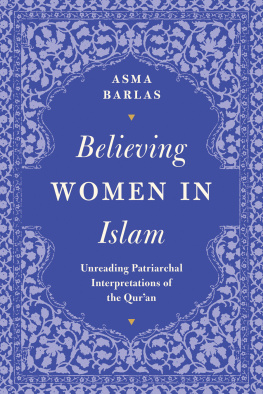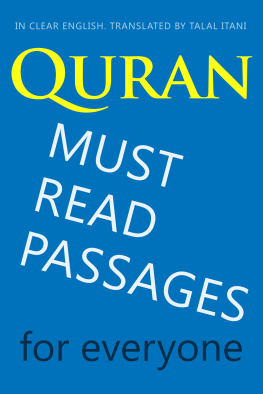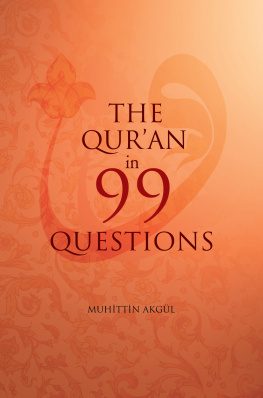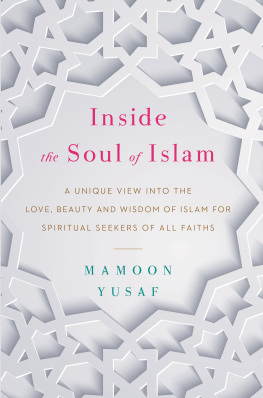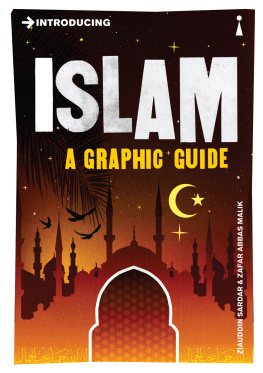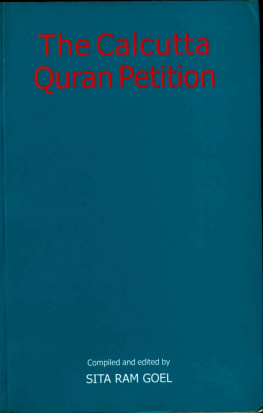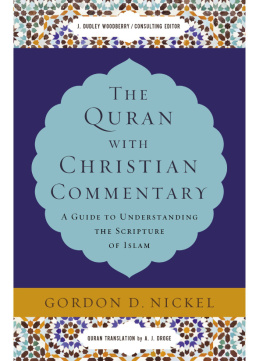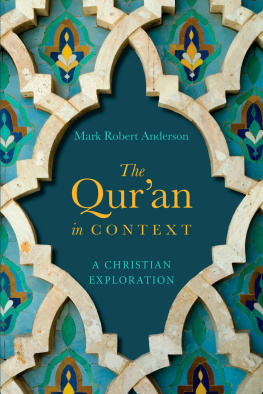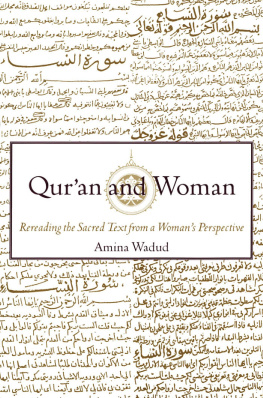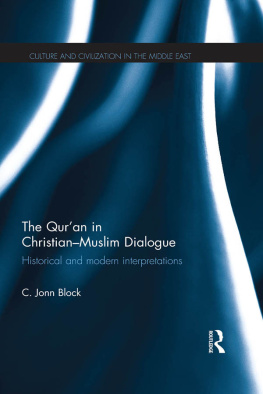Barlas - Believing women in Islam: unreading patriarchal interpretations of the Qurān
Here you can read online Barlas - Believing women in Islam: unreading patriarchal interpretations of the Qurān full text of the book (entire story) in english for free. Download pdf and epub, get meaning, cover and reviews about this ebook. City: Austin;Tex, year: 2019, publisher: Saqi;University of Texas Press, genre: Religion. Description of the work, (preface) as well as reviews are available. Best literature library LitArk.com created for fans of good reading and offers a wide selection of genres:
Romance novel
Science fiction
Adventure
Detective
Science
History
Home and family
Prose
Art
Politics
Computer
Non-fiction
Religion
Business
Children
Humor
Choose a favorite category and find really read worthwhile books. Enjoy immersion in the world of imagination, feel the emotions of the characters or learn something new for yourself, make an fascinating discovery.
Believing women in Islam: unreading patriarchal interpretations of the Qurān: summary, description and annotation
We offer to read an annotation, description, summary or preface (depends on what the author of the book "Believing women in Islam: unreading patriarchal interpretations of the Qurān" wrote himself). If you haven't found the necessary information about the book — write in the comments, we will try to find it.
Barlas: author's other books
Who wrote Believing women in Islam: unreading patriarchal interpretations of the Qurān? Find out the surname, the name of the author of the book and a list of all author's works by series.
Believing women in Islam: unreading patriarchal interpretations of the Qurān — read online for free the complete book (whole text) full work
Below is the text of the book, divided by pages. System saving the place of the last page read, allows you to conveniently read the book "Believing women in Islam: unreading patriarchal interpretations of the Qurān" online for free, without having to search again every time where you left off. Put a bookmark, and you can go to the page where you finished reading at any time.
Font size:
Interval:
Bookmark:

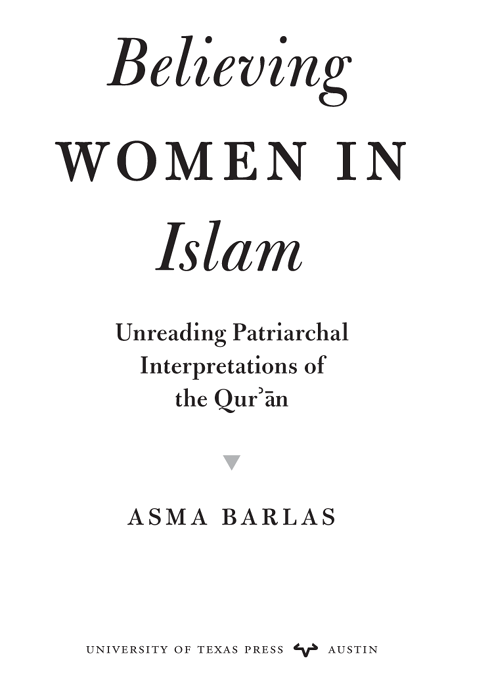
Copyright 2002, 2019 by the University of Texas Press
All rights reserved
Printed in the United States of America
Revised edition, 2019
Requests for permission to reproduce material
from this work should be sent to:
Permissions
University of Texas Press
P.O. Box 7819
Austin, TX 78713-7819
utpress.utexas.edu/rp-form
The paper used in this book meets the minimum requirements of ANSI/NISO Z39.48-1992 (R1997) (Permanence of Paper). 
LIBRARY OF CONGRESS CATALOGING-IN-PUBLICATION DATA
Names: Barlas, Asma, author.
Title: Believing women in Islam : unreading patriarchal
interpretations of the Qurn / Asma Barlas.
Description: Revised edition.
Austin : University of Texas Press, 2019.
Includes bibliographical references and index.
Identifiers: LCCN 2018012130
ISBN 978-1-4773-1592-7 (pbk. : alk. paper)
ISBN 978-1-4773-1593-4 (library e-book)
ISBN 978-1-4773-1594-1 (non-library e-book)
eISBN: 9780863564727
Subjects: LCSH: Women in Islam. | Women in the Qurn.
Womens rightsReligious aspectsIslam.
Classification: LCC BP173.4 .B35 2019
DDC 297.1/2283054dc23
LC record available at https://lccn.loc.gov/2018012130
doi:10.7560/315910
Do they not then
Earnestly seek to understand
The Qurn, or are
Their hearts locked up?
THE QURN (47:24 [ALI 1988, 1385])
With love,
FOR
Ulises Ali, who has made his journey into Islam,
AND FOR
Anwar and Iqbal Barlas, who have completed theirs.
1. The Qurn and Muslim Women:
Reading Patriarchy, Reading Liberation
2. Texts and Textualities:
The Qurn, Tafsr, and Ahdith
3. Intertextualities, Extratextual Contexts:
The Sunnah, Sharah, and the State
4. The Patriarchal Imaginary of Father/s:
Divine Ontology and the Prophets
5. Abrahams Sacrifice in the Qurn:
Beyond the Body
6. The Qurn, Sex/Gender, and Sexuality:
Sameness, Difference, Equality
7. The Family and Marriage:
Retrieving the Qurns Egalitarianism
The central question I have posed in this book, whether or not the Qurn is a patriarchal text, is perhaps not a meaningful one from the Qurns perspective since its teachings are not framed in terms of the claims made by either traditional or modern patriarchies. However, since the Qurn was revealed in/to an existing patriarchy and has been interpreted by adherents of patriarchies ever since, Muslim women have a stake in challenging its patriarchal exegesis.
In writing this book, I have wanted not only to challenge oppressive readings of the Qurn but also to offer a reading that confirms that Muslim women can struggle for equality from within the framework of the Qurns teachings, contrary to what both conservative and progressive Muslims believe. I am always disheartened to hear progressive Muslims claim(dis)ingenuously, it seems to methat Islamism is Islamism, as a young Algerian feminist puts it in a critically acclaimed film shown recently in the West. To identify Islam inseparably with oppression is to ignore the reality of misreadings of the sacred text, as Abdolkarim Soroush (2000, 86) calls them. Every religion is open to variant readings; the Christianity of the Crusades, the Inquisition, and the Conquest that wiped out millions of people in the name of Christ and commerce bears little family resemblance to the liberation theology of today. Confusing Islam with Islamism or Islamists also ignores that Islam does not sanction a clergy or invest anyone with the right to monopolize religious meaning. To accept the authority of any group and then to resign oneself to its misreadings of Islam not only makes one complicit in the continued abuse of Islam and the abuse of women in the name of Islam but also means losing the battle over meaning without even fighting it, as Abdullahi An-Naim (1990) reminds us.
This is not to say that attempts to rethink our understanding of Islam or to reread the Qurn are going to be easy, given the control over religious knowledge of obscurantists and experts alike. Yet more and more Muslims, realizing that no one has a monopoly over the meaning of what God says, as Aref Ali Nayed (1992) puts it, are beginning to reclaim their interpretive rights. In fact, the struggle to reclaim such rights may be related proportionally to attempts by some Muslim states and clerics to keep Muslims from reading, a true irony for a people who believe that Revelation to the unlettered Prophet commenced with the single word Iqra! or Read!
Although the practice of Islam concerns only Muslims, Muslim practices are of concern to the community of nations in which we live. I have thus written this work with both Muslims and non-Muslims in mind. Writing for such different audiences in a shared vocabulary has proven hard to do, not because I could not always find the right words, but because so many people are invested in the myth of radical difference; that is, the false but comforting idea that they share absolutely nothing with Others. To speak to such people simultaneously and in the same language is to threaten in some very real way the imagined borders that serve as the markers of their identities; it is thus to call forth unrelenting animosity against oneself, as I have discovered over the years.
To conservative Muslims, terms like antipatriarchal, sexual inequality, liberation, and even hermeneuticsall of which I use liberallysmack too much of the epistemology of non-Muslim Others to be safely applied to themselves, let alone used in reading the Qurn. Consequently, even though I engage Western/feminist thought only circumspectly, and often to differentiate and privilege what I take to be a Qurnic viewpoint, my language and the mere act of engagement are likely to render me a Western feminist in the eyes of those Muslims who are prone to hearing in such languageand in any criticism of Muslim menthe subversive voices of Western feminists. Mislabeling Muslim women in this way not only denies the specificity, autonomy, and creativity of their thought, but it also suggests, falsely, that there is no room from within Islam to contest inequality or patriarchy.
Conversely, to feminists and non-Muslim Westerners, terms like liberatory and antipatriarchal are much too self-referential to be applied to, or used meaningfully by, Others, especially Muslims. My use of these terms for the Qurn, as well as my favorable reading of it in comparison with Western/feminist discourses, will doubtless render me a Muslim apologist in their eyes. To such people, it is inconceivable that Islam (usually labeled Other/Eastern) has any truths to offer that may be commensurable with Judaism and Christianity (considered Western), much less with insights claimed by secular feminisms. Such views, however, ignore the scripturally linked nature and Middle Eastern origin of all three religions, hence the commonality of some of their truth claims. In positing a hyperseparation between Islam and the West, they also ignore that counterposing Islam to the West is misleading in that Islam is a way of life and not an imagined geography, to borrow Edward Saids (1979) rich phrase; it cannot therefore meaningfully be compared to one. Further, Islam not only exists within the West but also has helped to constitute the West, as Said so compellingly demonstrated two decades ago.
Font size:
Interval:
Bookmark:
Similar books «Believing women in Islam: unreading patriarchal interpretations of the Qurān»
Look at similar books to Believing women in Islam: unreading patriarchal interpretations of the Qurān. We have selected literature similar in name and meaning in the hope of providing readers with more options to find new, interesting, not yet read works.
Discussion, reviews of the book Believing women in Islam: unreading patriarchal interpretations of the Qurān and just readers' own opinions. Leave your comments, write what you think about the work, its meaning or the main characters. Specify what exactly you liked and what you didn't like, and why you think so.

